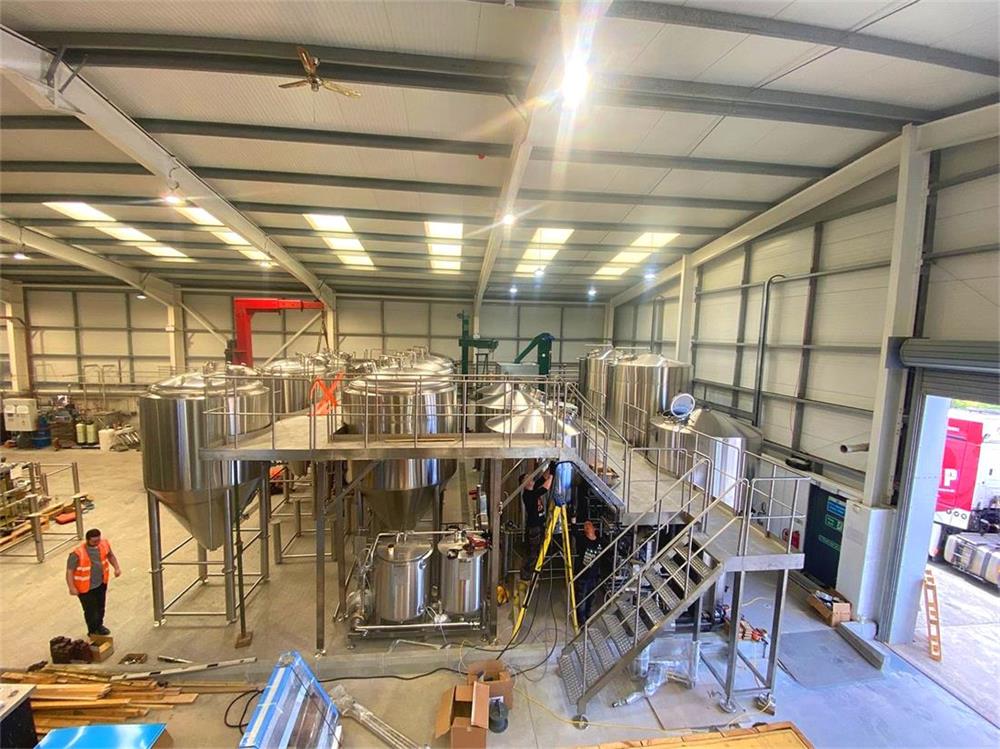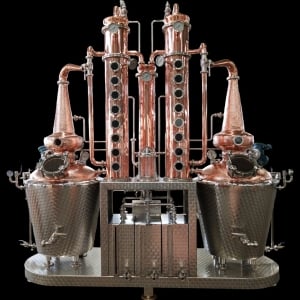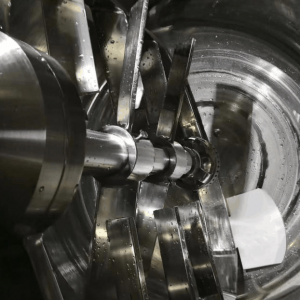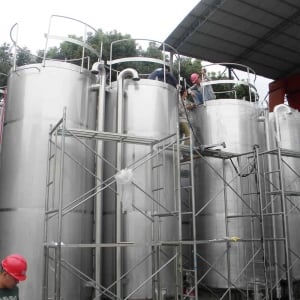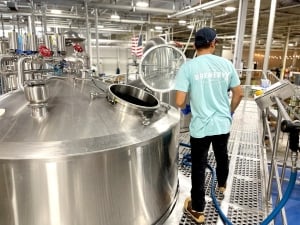Table of Contents
ToggleWhat is a Commercial Automated Brewing System?
A commercial automated brewing system is a technologically advanced solution designed to simplify and optimize the brewing process on a commercial scale. While traditional brewing methods require a lot of manual labor and precision, these modern systems streamline the process using automation and sophisticated technology.
There are a few essential components of these systems:
- Control Panel: This is the brain of the operation. With touch screen interfaces, brewers can easily adjust settings, control fermentation temperatures, and more.
- Automated Mashing: Instead of manually adding grains, the system does it for you. This ensures consistency in every batch.
- Temperature Control: Precise temperature control is crucial in brewing. Automated systems provide accurate temperature regulation throughout the process.
Historically, brewing was a meticulous and labor-intensive process. The introduction of automation in brewing has not only simplified the process but has also made it more consistent, ensuring that every batch of beer tastes the same.
One of the primary benefits of using an automated brewing system is the reduction in manual errors. For instance, over-boiling or incorrect temperatures can adversely affect the beer’s taste. With automation, these risks are significantly minimized.
The use of commercial automated brewing systems is now widespread among modern breweries, aiming to meet growing demand, ensure product consistency, and streamline their operations.
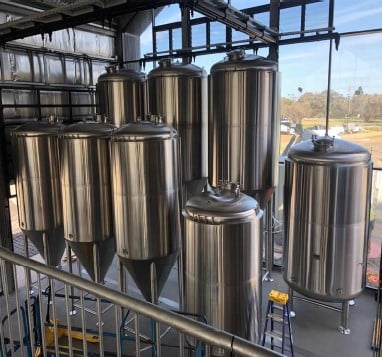
How much does a Commercial Automated Brewing System Cost?
The cost of a commercial automated brewing system varies significantly based on its capacity, features, brand, and place of manufacture. Generally, the more advanced the system, the higher the cost. It’s essential to factor in installation costs, maintenance, and training when considering the total investment.
The table below provides a general price range for commercial automated brewing systems from various renowned brands:
| Brand Name | Capacity (Liters) | Price Range (USD) |
|---|---|---|
| BrewTech Solutions | 500 | $20,000 – $25,000 |
| AutoBrew Masterminds | 1000 | $30,000 – $40,000 |
| MegaBrew Systems | 2000 | $45,000 – $60,000 |
| ProBrewer Innovations | 5000 | $80,000 – $100,000 |
| AlphaBrew Mechanics | 10000 | $120,000 – $150,000 |
It’s essential to note that while the initial cost of the system is a significant factor, other ongoing costs like maintenance, software updates, and potential part replacements should be considered.
Additionally, specific features can impact the price. For example, a system with integrated fermentation tanks or advanced quality control features might cost more than a basic setup.
Import duties, taxes, and shipping charges can also influence the overall cost, especially when purchasing from international manufacturers. Therefore, it’s advisable to consult with suppliers about the total costs involved.
For those on a tight budget, some companies offer financing options or lease-to-own arrangements. This can be a viable solution for businesses that need the technology but may not have the immediate capital to invest upfront.
One must also consider the return on investment (ROI). While these systems can be expensive, they can also lead to significant cost savings in the long run. Automated systems can produce larger batches in shorter times, use ingredients more efficiently, and reduce labor costs.
What are the Types of Commercial Automated Brewing Systems?
Commercial automated brewing systems have undergone tremendous advancement in recent years. As demand grows and technology evolves, manufacturers have introduced several types of systems to cater to varying brewery sizes and needs.
- Microbrewery Systems: Designed for small-scale production, these systems typically have capacities ranging from 50 to 500 liters. They are perfect for craft brewers who prioritize quality over quantity. While they’re smaller in scale, they still offer robust automation features.Brand NameCapacity (Liters)Price Range (USD)MiniTech Brews50$5,000 – $7,000CraftBrew Pro300$15,000 – $20,000
- Pub Brewery Systems: Made for pubs or restaurants that brew their beer on-site. They balance between small-scale craft production and the need for slightly larger volumes to serve direct customers.
- Industrial Brewery Systems: These are for large-scale production, with capacities exceeding 10,000 liters. Major beer brands and large brewing facilities use these systems. They’re designed for efficiency and high-volume production.
- R&D Brewery Systems: Research and development systems are for experimental batches. Breweries use them to test new recipes, ingredients, or brewing methods without committing to large-scale production.
- Mobile Brewing Systems: A newer addition to the market, these systems are mounted on trailers or trucks, allowing brewers to move their operations for events, collaborations, or special occasions.
Each system type has its unique features and pricing, but all aim to automate and simplify the brewing process. When selecting a system, it’s vital to consider the scale of production, available space, and specific brewing needs.
Functions of a Commercial Automated Brewing System
Commercial automated brewing systems have revolutionized the way beer is produced on a large scale. These systems are equipped with numerous functionalities designed to make the brewing process more efficient, consistent, and scalable.
Mashing: One of the most critical steps in brewing is mashing. The system automatically mixes the grains with water at the right temperature. This process extracts the sugars from the grains, which will later be fermented into alcohol.
Boiling: Post mashing, the liquid, known as wort, is boiled. Automated systems ensure that this boiling occurs at the precise temperature and duration required for the specific beer being produced.
Fermentation Monitoring: The fermentation process can be finicky. Too warm or too cold, and the entire batch can be ruined. Automated systems continuously monitor the fermentation tanks, adjusting the temperature as needed to ensure optimal yeast activity.
Cleaning and Sanitization: After brewing, the equipment needs thorough cleaning to prevent contamination of subsequent batches. Automated systems come with integrated cleaning protocols that ensure every part of the system is cleaned and sanitized efficiently.
Quality Control and Data Analytics: Advanced systems now integrate sensors that monitor various parameters during brewing. These data points are crucial for maintaining consistency across batches and for continuous improvement. Additionally, real-time data analytics can alert brewers to any issues immediately, allowing for swift interventions.
The automation of these functions not only ensures a higher quality of beer but also allows breweries to operate more efficiently, reducing wastage, and increasing profitability.
In What Applications is a Commercial Automated Brewing System Used?
The brewing industry has witnessed rapid transformations with the inception of automation. Commercial automated brewing systems, with their ability to produce consistent, high-quality beer, have found applications in various sectors and settings.
Craft Breweries: The craft beer movement has taken the world by storm. Small and medium-sized breweries prioritize quality, unique flavors, and innovative techniques. Automated systems provide the consistency and precision required to maintain and reproduce these distinct flavors across batches.
Large-scale Industrial Breweries: Global beer brands rely on huge volumes. The sheer scale of production requires systems that can handle vast quantities while ensuring that every bottle or can of beer tastes the same, regardless of where or when it was brewed.
Pubs and Restaurants: Many establishments now choose to brew their beer on-site. A smaller, automated system offers them the chance to provide fresh, unique brews to their customers, setting them apart from competitors and enhancing the overall dining experience.
Educational Institutions: Brewing science and technology courses have become more prevalent in universities and specialized institutions. Automated systems serve as advanced teaching tools, giving students hands-on experience with the latest brewing technologies.
Festivals and Events: Mobile automated brewing systems have paved the way for live brewing demonstrations at events. These setups can be transported to different locations, offering attendees a fresh brew crafted right before their eyes.
Research and Development: Before introducing a new beer to the market, breweries invest time and resources in experimentation. Automated systems designed for R&D allow for small-batch production, testing new ingredients, or tweaking processes to achieve the desired result.
Collaborative Brews: Collaboration between breweries is a growing trend. Brewers come together to craft unique beers, sharing knowledge and techniques. Automated systems provide the flexibility and consistency required for these joint ventures, ensuring the collaborative effort’s success.
Specialty Brews: Sometimes, breweries create limited-edition or seasonal beers. These specialty brews might require unique processes or ingredients. Automated systems can be easily adjusted to accommodate these variations, ensuring the perfect brew every time.
From small craft setups to giant industrial operations, commercial automated brewing systems are changing the way beer is produced and consumed. Their ability to maintain consistency, increase efficiency, and offer flexibility makes them an invaluable tool in the modern brewing landscape.
How Can a Commercial Automated Brewing System Benefit You?
The introduction of commercial automated brewing systems into the beer-making industry has transformed the way breweries operate. From small craft breweries to large industrial setups, these systems offer a range of benefits that make brewing efficient, consistent, and profitable.
Efficiency Boost: One of the primary advantages of an automated brewing system is its efficiency. By automating many of the brewing process’s manual aspects, these systems can produce more beer in less time, optimizing production schedules and increasing the volume of saleable product.
Consistent Quality: In the brewing industry, consistency is crucial. Fans of a particular beer brand expect the same taste, aroma, and mouthfeel every time they crack open a bottle. Automated systems, with their precise control over ingredients, temperatures, and timings, ensure that every batch matches the previous one in terms of quality.
Resource Savings: Through precise measurements and control, automated systems can lead to savings in raw materials, energy, and water. This not only reduces costs but also minimizes waste, making the brewing process more sustainable.
Real-time Data Monitoring: Modern commercial automated brewing systems come equipped with various sensors and analytics tools. These tools provide brewers with real-time data about the brewing process, enabling them to make informed decisions and quickly address any issues that may arise.
Scalability: As a brewery grows, its production needs will change. Automated systems can be scaled up (or down) to match production demands. Whether it’s adding more fermentation tanks or integrating additional features, these systems can grow with the business.
Labor Savings: With automation handling many of the tasks previously done by hand, breweries can operate with fewer staff. This can lead to significant savings in labor costs. Furthermore, staff can be reallocated to other areas of the business, such as sales, marketing, or customer service.
Safety Enhancements: Brewing involves handling hot liquids, heavy equipment, and sometimes hazardous chemicals for cleaning and sanitization. Automated systems can reduce the risks associated with these tasks, ensuring a safer working environment.
How to Choose the Right Commercial Automated Brewing System?
Selecting the appropriate commercial automated brewing system is pivotal for any brewery, whether it’s a startup or an established entity looking to scale up or modernize. A well-chosen system can streamline operations, boost efficiency, and ensure consistent product quality. Here’s a comprehensive guide on how to make the right choice.
Assess Your Production Needs: Before diving into the world of brewing systems, a brewery must evaluate its production requirements. This involves considering current production volumes, future growth prospects, and the types of beers intended for production. Having clear data will provide direction during the system selection process.
Budget Considerations: Budget is always a crucial factor. The range in prices for commercial automated brewing systems is vast. Establish a clear budget, considering not just the system’s initial cost but also installation costs, potential future upgrades, and ongoing maintenance expenses.
Features and Capabilities: Different systems come with varied features. Some might offer advanced quality control mechanisms, while others might focus on energy efficiency. When assessing a system, make a list of essential features versus desirable ones.
| Essential Features | Desirable Features |
|---|---|
| Automated Mashing | Advanced Analytics |
| Temperature Control | Remote Monitoring |
| Automated Cleaning | Cloud Data Storage |
Vendor Reputation: The reputation of the system manufacturer or vendor plays a significant role. Research vendors, check for reviews, ask for references, and, if possible, visit facilities where their systems are in operation.
Flexibility and Scalability: The brewing industry is dynamic. As a brewery grows or as market demands shift, the production needs might change. Choosing a system that’s both flexible and scalable ensures that it remains relevant and efficient in the long run.
After-sales Support and Training: The installation of a new system often requires training. Breweries should prioritize vendors that offer comprehensive training and robust after-sales support. This ensures that the system runs optimally and any issues are promptly addressed.
The selection process can be daunting, given the technicalities and the investment involved. However, by following a structured approach and focusing on the brewery’s unique needs and circumstances, it becomes significantly easier to pinpoint the system that will drive success.
Who are the Best 10 Manufacturers of Commercial Automated Brewing Systems?
The brewing industry’s evolution, paired with technological advancements, has led to the emergence of numerous commercial automated brewing system manufacturers. Here’s an overview of the top 10 manufacturers, recognized for their innovation, reliability, and contribution to the industry.
1. BrewTech Solutions: A frontrunner in brewing automation, BrewTech Solutions offers systems that seamlessly blend cutting-edge technology with user-friendly interfaces. Known for their durability and efficiency, their systems cater to both craft and industrial brewers.
2. AutoBrew Masterminds: With a focus on sustainability and energy efficiency, AutoBrew Masterminds has carved a niche for itself. Their systems are designed to reduce waste and energy consumption without compromising beer quality.
3. MegaBrew Systems: Serving the industry for decades, MegaBrew is renowned for its high-capacity systems that are ideal for large-scale breweries. Their reputation for durability and efficiency is unparalleled.
4. ProBrewer Innovations: Merging traditional brewing principles with modern technology, ProBrewer Innovations offers systems that balance automation with manual control, allowing brewers to experiment while maintaining consistency.
5. AlphaBrew Mechanics: With a strong emphasis on research and development, AlphaBrew Mechanics regularly introduces innovative features, ensuring that breweries equipped with their systems stay ahead of the curve.
6. Craftmatic Systems: Dedicated to the craft brewing community, Craftmatic Systems offers solutions that cater specifically to small and medium-sized breweries. Their systems prioritize flexibility, allowing brewers to produce diverse beer types without extensive system adjustments.
7. BeerGenius Manufacturing: An emerging name, BeerGenius is gaining traction for its integration of AI and machine learning into its brewing systems. This forward-thinking approach enables unprecedented precision and consistency.
8. FermentaTronix: Recognized for their comprehensive post-sales support, FermentaTronix provides robust training and maintenance programs. Their systems, designed for intuitive use, are especially popular among new entrants in the brewing industry.
9. BrewMatic Innovators: Focusing on space optimization, BrewMatic Innovators specializes in compact systems that don’t compromise on features. Their designs are ideal for urban breweries with space constraints.
10. AquaBrew Engineering: AquaBrew places water conservation at the heart of its designs. Their systems prioritize water reusability and reduction, addressing a vital sustainability concern in the brewing process.
These manufacturers have set industry standards, driven innovation, and played pivotal roles in shaping the modern brewing landscape. When considering a new system, exploring offerings from these top players can provide valuable insights into the best available options.
Where to Buy Commercial Automated Brewing Systems?
In the ever-evolving landscape of brewing, knowing where to purchase the ideal commercial automated brewing system can make all the difference in the production process. Here are several platforms and avenues that prospective buyers can explore:
1. Direct Manufacturer Websites: Many brewing system manufacturers have their websites showcasing their products, features, and technical specifications. Sites often have contact forms, enabling potential buyers to ask specific questions or request quotes. Examples include YoLong Brewtech, BrewTech Solutions, and AutoBrew Masterminds.
2. Trade Shows and Exhibitions: These events offer a unique opportunity for prospective buyers to see the equipment in person, interact with manufacturers, and sometimes even witness live demos. Major brewing exhibitions occur annually across different parts of the world.
3. Online Retail Platforms: Websites like Alibaba, Made-in-China, and Indiamart often list products from various brewing equipment manufacturers. These platforms enable buyers to compare prices, read reviews, and contact suppliers directly.
4. Brewing Forums and Communities: Online communities, such as ProBrewer and HomeBrewTalk, have sections dedicated to equipment sales and purchases. Experienced brewers often share insights and recommendations on these forums.
5. Local Distributors and Resellers: Depending on the region, there might be local distributors or resellers specializing in brewing equipment. These entities often have partnerships with global manufacturers, ensuring authentic and quality products.
6. Direct Factory Visits: For those willing to make the trip, visiting the manufacturing facilities can be invaluable. It provides an on-ground view of the production process, quality assurance measures, and the opportunity to interact directly with the team. For instance, YoLong Brewtech’s state-of-the-art manufacturing plant in Ningbo City Economic Development Zone is open to prospective clients.
Product Advantages of Chinese Commercial Automated Brewing Systems
Chinese manufacturers, over the years, have marked their significance in the global brewing equipment market. The reasons are multifold: advancements in technology, adherence to international standards, and cost-effectiveness. Let’s delve into the advantages of choosing a Chinese brewing system:
Economical Solutions: Chinese manufacturers have mastered the art of producing high-quality brewing systems at competitive prices. This cost advantage doesn’t necessarily compromise quality but results from efficient manufacturing processes and a vast domestic supply chain.
Advanced Technology: Chinese firms, like YoLong Brewtech, have invested heavily in R&D. With over 15 years in the industry, companies like YoLong ensure that their systems are on par with, if not exceeding, global standards. They continually introduce innovative features catering to modern brewing demands.
Customization: One distinct advantage with manufacturers like YoLong Brewtech is the emphasis on customization. Their manufacturing plant, spanning a massive 36,000 m2, is equipped to meet virtually any specification a customer requires, ensuring every brewing system is tailored to unique needs.
International Certifications: Recognizing the importance of global markets, Chinese manufacturers ensure their products comply with international safety and quality standards. This commitment instills confidence in buyers worldwide.
Integrated Solutions: Beyond just the brewing equipment, many Chinese manufacturers provide end-to-end solutions. This includes training, installation support, maintenance, and even assistance in crafting unique beer recipes.
Diverse Product Range: Catering to a global audience has led Chinese manufacturers to develop a diverse product range. Whether it’s equipment for craft beer, cold-brewed coffee, kombucha, or infused teas, companies like YoLong Brewtech have broadened their offerings to meet varied market demands.
Sustainable Practices: Sustainability has become central to modern manufacturing. Recognizing its importance, Chinese manufacturers focus on producing energy-efficient systems that optimize water usage and minimize waste, making the brewing process environmentally friendly.
Global Presence: Major Chinese brewing equipment manufacturers have established a global footprint. With distributors, resellers, and service centers across continents, they ensure that customers, no matter where they are, receive prompt service and support.
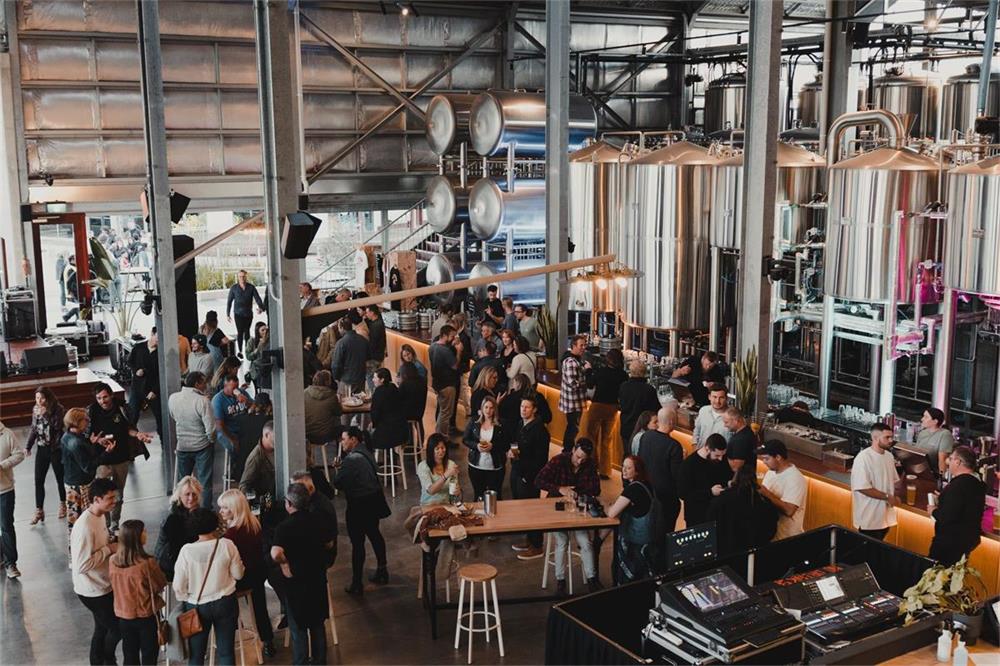
Who is the Best Chinese Supplier for Commercial Automated Brewing Systems
When it comes to selecting a Chinese supplier for commercial automated brewing systems, a few names stand out due to their impeccable reputation, product quality, and customer service. Among them, YoLong Brewtech has consistently emerged as a preferred choice for brewers worldwide.
Company Profile: YoLong Brewtech, founded in 2004, boasts over 15 years of rich experience in brewing equipment manufacturing. With their dedicated and experienced team, they have pioneered in fabricating custom-designed and pre-made brewing equipment, setting the benchmark for value and quality. Their vast product line caters to beverages like beer, cold-brewed coffee, kombucha, infused teas, and wine.
State-of-the-Art Facility: Situated in the Ningbo City Economic Development Zone, China, YoLong’s manufacturing plant is nothing short of a technological marvel. Spanning 36,000 m2, this facility is equipped with modern machinery and technologies that ensure every product meets the highest quality standards.
Customization: One of YoLong’s standout features is its ability to craft equipment based on specific customer needs. Their team works meticulously to ensure every custom-designed project aligns with the client’s exact specifications.
Global Reach: While based in China, YoLong Brewtech’s influence spans the globe. Their products can be found in breweries across continents, a testament to their international appeal and trustworthiness.
Conclusion: In a market saturated with suppliers, YoLong Brewtech shines due to its unwavering commitment to quality, innovation, and customer satisfaction. It isn’t just a supplier; it’s a trusted partner for breweries worldwide.
FAQ
1. What is the average lifespan of a commercial automated brewing system?
Most commercial automated brewing systems are designed to last for several years, with an average lifespan ranging from 10 to 20 years. However, this can vary based on usage, maintenance practices, and the quality of the system.
2. How often should I service my brewing system?
It’s recommended to service your brewing system at least once a year. Regular maintenance ensures optimal performance and can identify potential issues before they become major problems.
3. Can I upgrade my existing manual brewing system to an automated one?
Yes, many manufacturers offer solutions to upgrade manual systems to automated ones. This often involves integrating digital controls, sensors, and software to provide automated functions.
4. What is the energy consumption of these systems?
The energy consumption varies based on the system’s size, design, and functionalities. Manufacturers typically provide detailed energy consumption metrics. Some modern systems are designed to be energy-efficient, reducing operational costs.
5. How do I clean and sanitize my commercial automated brewing system?
Most automated systems come with CIP (Clean-in-Place) systems, which automate the cleaning and sanitizing process. It’s essential to follow the manufacturer’s guidelines on cleaning agents, frequency, and procedures to ensure the system remains contamination-free.
6. Are Chinese brewing systems compatible with international brewing standards?
Yes, leading Chinese manufacturers like YoLong Brewtech design their systems in adherence to international brewing standards. They cater to global markets and ensure their products meet or exceed the required standards.
7. Can I get a custom-designed brewing system tailored to my brewery’s needs?
Absolutely. Manufacturers like YoLong Brewtech specialize in crafting custom-designed brewing equipment based on specific requirements. Whether it’s a particular brewing capacity, design, or feature, they can customize the system to fit your unique needs.

